
Edward Witten is an American theoretical physicist known for his contributions to string theory, topological quantum field theory, and various areas of mathematics. He is a professor emeritus in the school of natural sciences at the Institute for Advanced Study in Princeton. Witten is a researcher in string theory, quantum gravity, supersymmetric quantum field theories, and other areas of mathematical physics. Witten's work has also significantly impacted pure mathematics. In 1990, he became the first physicist to be awarded a Fields Medal by the International Mathematical Union, for his mathematical insights in physics, such as his 1981 proof of the positive energy theorem in general relativity, and his interpretation of the Jones invariants of knots as Feynman integrals. He is considered the practical founder of M-theory.
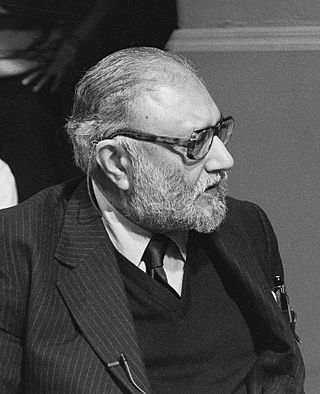
Mohammad Abdus Salam was a Pakistani theoretical physicist. He shared the 1979 Nobel Prize in Physics with Sheldon Glashow and Steven Weinberg for his contribution to the electroweak unification theory. He was the first Pakistani and the first scientist from an Islamic country to receive a Nobel Prize and the second from an Islamic country to receive any Nobel Prize, after Anwar Sadat of Egypt.
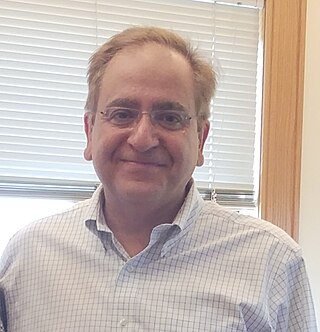
Cumrun Vafa is an Iranian-American theoretical physicist and the Hollis Professor of Mathematics and Natural Philosophy at Harvard University.

Andrew Eben Strominger is an American theoretical physicist who is the director of Harvard's Center for the Fundamental Laws of Nature. He has made significant contributions to quantum gravity and string theory. These include his work on Calabi–Yau compactification and topology change in string theory, and on the stringy origin of black hole entropy. He is a senior fellow at the Society of Fellows, and is the Gwill E. York Professor of Physics.

Neil Geoffrey Turok is a South African physicist. He has held the Higgs Chair of Theoretical Physics at the University of Edinburgh since 2020, and has been director emeritus of the Perimeter Institute for Theoretical Physics since 2019. He specializes in mathematical physics and early-universe physics, including the cosmological constant and a cyclic model for the universe.

David James Thouless was a British condensed-matter physicist. He was the winner of the 1990 Wolf Prize and a laureate of the 2016 Nobel Prize for physics along with F. Duncan M. Haldane and J. Michael Kosterlitz for theoretical discoveries of topological phase transitions and topological phases of matter.

Giorgio Parisi is an Italian theoretical physicist, whose research has focused on quantum field theory, statistical mechanics and complex systems. His best known contributions are the QCD evolution equations for parton densities, obtained with Guido Altarelli, known as the Altarelli–Parisi or DGLAP equations, the exact solution of the Sherrington–Kirkpatrick model of spin glasses, the Kardar–Parisi–Zhang equation describing dynamic scaling of growing interfaces, and the study of whirling flocks of birds. He was awarded the 2021 Nobel Prize in Physics jointly with Klaus Hasselmann and Syukuro Manabe for groundbreaking contributions to theory of complex systems, in particular "for the discovery of the interplay of disorder and fluctuations in physical systems from atomic to planetary scales".
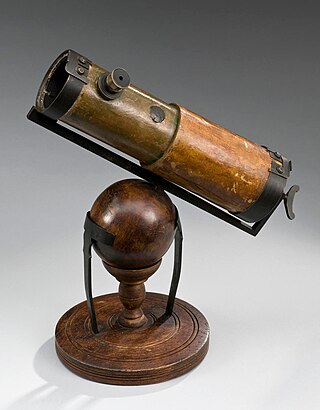
The Isaac Newton Medal and Prize is a gold medal awarded annually by the Institute of Physics (IOP) accompanied by a prize of £1,000. The award is given to a physicist, regardless of subject area, background or nationality, for outstanding contributions to physics. The award winner is invited to give a lecture at the Institute. It is named in honour of Sir Isaac Newton.

John Michael Kosterlitz is a Scottish-American physicist. He is a professor of physics at Brown University and the son of biochemist Hans Kosterlitz. He was awarded the 2016 Nobel Prize in physics along with David Thouless and Duncan Haldane for work on condensed matter physics.
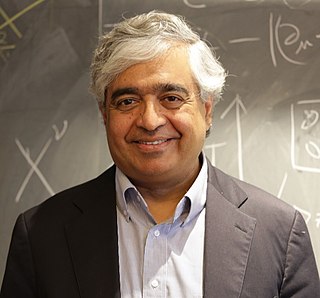
Subir Sachdev is Herchel Smith Professor of Physics at Harvard University specializing in condensed matter. He was elected to the U.S. National Academy of Sciences in 2014, received the Lars Onsager Prize from the American Physical Society and the Dirac Medal from the ICTP in 2018, and was elected Foreign Member of the Royal Society ForMemRS in 2023. He was a co-editor of the Annual Review of Condensed Matter Physics 2017–2019, and is Editor-in-Chief of Reports on Progress in Physics 2022-.
Clifford Victor Johnson is a British theoretical physicist and professor at the University of California, Santa Barbara department of Physics.
The Nevill Mott Medal and Prize is an award presented in selected years by the Institute of Physics in the United Kingdom, for distinguished research in condensed matter or materials physics. It was first established in 1997 thanks to a donation from Sir Nevill Mott's family. Sir Nevill Mott was one of the outstanding British condensed matter theorists and won a Nobel Prize in Physics in 1977. He died in 1996. The award consists of a silver medal and a prize of £1000.
John Bryan Taylor is a British physicist known for his contributions to plasma physics and their application in the field of fusion energy. Notable among these is the development of the "Taylor state", describing a minimum-energy configuration that conserves magnetic helicity. Another development was his work on the ballooning transformation, which describes the motion of plasma in toroidal (donut) configurations, which are used in the fusion field. Taylor has also made contributions to the theory of the Earth's Dynamo, including the Taylor constraint.

Frederick Duncan Michael Haldane, known as F. Duncan Haldane, is a British-born physicist who is currently the Sherman Fairchild University Professor of Physics at Princeton University. He is a co-recipient of the 2016 Nobel Prize in Physics, along with David J. Thouless and J. Michael Kosterlitz.

Jorge V. José is a Mexican/American physicist born in Mexico City. Currently the James H. Rudy Distinguished Professor of Physics at Indiana University. He has made seminal contributions to research in a variety of disciplines, including condensed matter physics, nonlinear dynamics, quantum chaos, biological physics, computational neuroscience and lately precision psychiatry. His pioneering work on the two-dimensional x-y model has been exceedingly influential in many areas of physics and has garnered many citations. He edited the book on the “40 Years of Berezinskii-Kosterlitz-Thouless Theory”, on two-dimensional topological phase transitions in 2013. Three years later KT were awarded the 2016 Nobel Physics Prize.
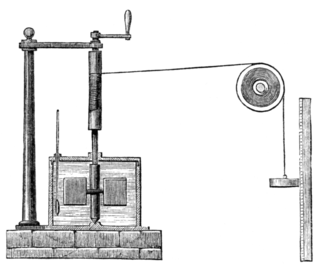
The James Joule Medal and Prize is awarded by the Institute of Physics. It was established in 2008, and was named in honour of James Prescott Joule, British physicist and brewer. The award is made for distinguished contributions to applied physics. The medal is silver and is accompanied by a prize of £1000.
The Institute of Physics awards numerous prizes to acknowledge contributions to physics research, education and applications. It also offers smaller specific subject-group prizes, such as for PhD thesis submissions.
Nikolas P. Breuckmann is a German mathematical physicist affiliated with the University of Bristol, England. He is, as of Spring 2024, a visiting scientist and program organizer at the Simons Institute for the Theory of Computing at the University of California, Berkeley. His research focuses on quantum information theory, in particular quantum error correction and quantum complexity theory. He is known for his work on proving the NLTS conjecture, a famous open problem in quantum information theory.
Hannah Price is a British physicist and Professor of Theoretical Physics at the University of Birmingham. Her research considers topological phases in photonics and gases. She was awarded the 2018 James Clerk Maxwell Medal and Prize of the Institute of Physics.













